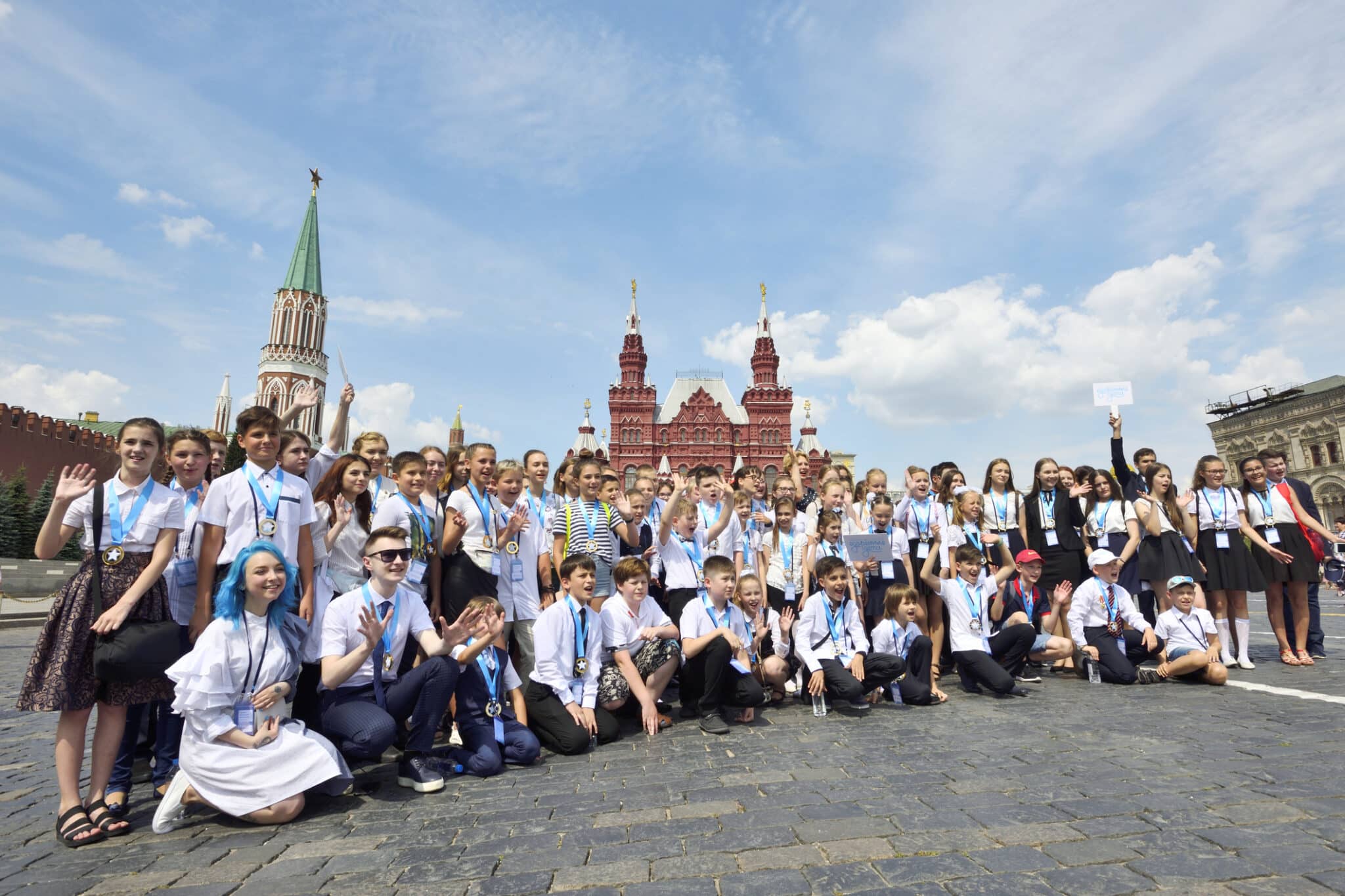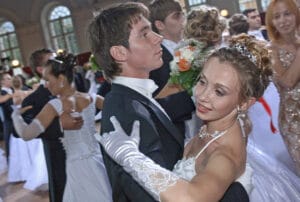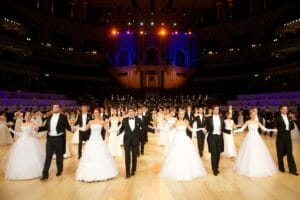High school graduation (выпускной) in Russia – and most of the former Soviet states – is a grand affair. In addition to a ceremony in which they are given diplomas, graduates have formal dinners, black-tie balls, and all night parties with concerts and fireworks.
Olga Dmitraschenko graduated in Moscow in 2006, after completing her high school experience via home schooling. She wrote of her high school graduation experience in the text that follows as part of a series of free Russian lessons sponsored by SRAS called Olga’s Blog, which documents – in simplified, modern Russian – her experience finishing high school, starting college, and living life in Moscow in 2006. The text, links, and format of this resource were last updated in 2023.
Briefly About High School Graduation in Russia
Russia’s tradition of holding grand graduation celebrations, like its grand New Year celebrations, dates back to Peter I. The first such recorded celebration took place in 1718 in Moscow at the School of Mathematical and Navigational Sciences. After, graduation parties were celebrated at the Naval Academy in St. Petersburg and other educational institutions.
These first celebrations included the issuance of certificates, parting words from the director and teachers, and then a festive banquet. Later, balls and dances were added.
After the October Revolution, the communists tried to make graduation a more solemn affair but later allowed the return of post-ceremony dances. Eventually, much more grandiose events began to be held, such as Scarlet Sails, first in Leningrad (now St. Petersburg) in 1968. This festival, which would later attract tourists from all over Europe, is a city-wide celebration with all-night street dancing, public concerts, fireworks, and quiz competitions.
Today, grand banquet halls are rented out and graduates arrive in tuxedos and evening gowns. Cities reserve their most recognizable places for all-night events. In Moscow, these include Red Square, Vorobyovy Gory, Gorky Park, and Poklonnaya Gora.
Some events are reserved for top students – those that have received gold and silver medals for exemplary academic performance. Such events have been held on Red Square and the prestigious State Kremlin Palace.
In recent years, an online celebration has also been held, at which major Russian celebrities will join students on social media via Russia’s popular VKontakte site.
High School Graduation in Russia: Simplified Russian Text from Olga’s Blog
This is Lesson 3 of Olga’s Blog, a series of free intermediate Russian lessons.
Note that:
- All of the bold words and phrases have annotation below.
- Red words and phrases indicate the subject of this blog entry’s grammar lesson.
- *Asterisks indicate slang.
Привет всем!
Сегодня я расскажу вам про свой выпускной, один из самых запомнившихся дней моей жизни!
Выпускной – очень важное событие в жизни каждого человека, поэтому его планируют заранее. Обычно, день его проведения назначают на конец июня, когда все школьные экзамены сданы, а оценки проставлены. Официальная часть выпускного вечера всегда проводится в школьном зале. Приходят родители и друзья. Сначала выпускники показывают концерт – ставят смешные сценки из школьной жизни, рассказывают стихи, поют песни, говорят слова благодарности в адрес учителей. Потом звенит последний звонок. И начинается церемония вручения аттестатов.
На сцену выходят директор и несколько учителей, говорят речь с пожеланиями успехов и счастья, а затем начинают вызывать учеников. Когда звучит фамилия выпускника, он поднимается на сцену, получает аттестат, благодарит учителей и возвращается к своему месту в зале. В это время его родители фотографируют и хлопают. Этот момент запоминается очень надолго. Момент, когда ты покидаешь школу и открываешь дверь в новый мир – таинственный и прекрасный, полный новых знаний и открытий.
В конце мероприятия все выпускники собираются на сцене и поют прощальную песню. А потом начинается настоящий праздник. Все едут отмечать окончание школы! Одни заказывают ресторан, другие теплоход. А наш класс арендовал Комплекс Славы на Поклонной горе на всю ночь. Когда мы приехали туда, оказалось что кроме нашего класса там еще двенадцать школ. Но здание было огромным и места хватило всем. В нашем распоряжении было два этажа – на первом стояли маленькие кафешки, где можно было перекусить, и мягкие диваны, где можно отдохнуть, на втором же было самое интересное – большой зал и сцена, что обещало большую тусу.*
От праздничной обстановки захватывало дыхание – все девушки были в сверкающих платьях, залы были усыпаны шариками и гирляндами, а на лицах выпускников сияли улыбки.
Праздник начался с поздравления выпускников, после чего на сцену вышли русские группы. Они оказались малоизвестными, поэтому я даже не помню, как они назывались. Концерт длился где-то с 11 вечера до 2 часов ночи. Многие танцевали, но большинство просто общались, фотографировались и подкреплялись бутербродами, гуляя по зданию. Наружу нас не выпускали – у дверей стояли грозные охранники, следившие, чтобы мы не выходили и не проносили спиртное. После концерта началась дискотека, и тут народ оживился. Все уже успели сдружиться и танцевали все вместе – было очень весело. Туса длилась до утра. Все радовались и зажигали.*
А утром уставшие, но полные впечатлений, разъехались по домам. И вот, уже через несколько дней начиналось самое трудное, то, к чему мы все так долго шли и готовились – вступительные экзамены. Но это уже другая история и о ней я расскажу вам в следующий раз.
До скорого! Пока!
Vocabulary and Cultural Annotations
-
Оценка проставлена: grades have been entered. Notice that Russian, grades are most often not referred to as “given” (дарить/подарить) They are “entered” (проставлять/проставить) or even “stood” (ставить/поставить).
-
Слова благодарности: words of thanks. Russians have a very longstanding tradition of making short, impromptu speeches to mark an occasion such as a birthday, anniversary, etc. To foreigners these can often seem gratuitous, especially when the speeches come in the form of toasts which must be finished with a shot of vodka!
-
Знание и открытие: knowledge and discovery. Notice both are in the plural in Olga’s example; “открытие” is usually used with the meaning of “opening.”
-
Теплоход: Motor ship. Most larger Russian cities are near major bodies of water. During the summer, cruises are quite popular.
-
Комплекс Славы на Поклонной горе: The “Complex to Glory on Greeting Hill” is part of Victory Park (Парк победи), one of Moscow’s largest and most impressive. Victory Park was built in celebration of the Allied Victory in WWII and also houses the looming Museum to the Great Patriotic War (what Russians call WWII) and a massive row of lighted fountains. The complex was built for the 50th anniversary of the war’s end and ironically involved the leveling of the hill it is named for.
-
Кафешка: the diminutive of “кафе” (café in Russian). It implies the café was most likely small and enjoyable. While not slang, diminutives most often fall in the category of familiar or informal speech.
-
Туса: slang word meaning “party.” Here, the diminutive “тусовка” is also often used. The standard word in Russian is “вечеринка.” The origins of the word are unknown.
-
Захватывать дыхание: to take one’s breath away (literally “to grab/grip breath”). A standard phrase in Russian. (захватывать/захватать, захватить)
-
Сверкающая платья: sparkling dresses. In Russian, words connected with light (cверкающий, яркий, блестящий), are also used to connote beauty and glamour.
-
Усыпаны шариками и гирляндами: bestrewn with small balls and garlands.
-
Сияли улыбки: smiles were beaming.
-
Наружу нас: outside of / excepting us. “Кроме нас” is more often used.
-
Зажигать/зажечь: slang term that is very widely used with the meaning “to have a very good and active time.” Literally, the word translates to “to set on fire.” It is often used in place of the standard Russian words “веселиться” or “танцевать.”
-
Вступительные экзамены: entrance exams. Only a few months after graduation and taking exit exams, those students hoping to go on to higher education must then take the entrance exams of their chosen institution.
Grammar Focus: Past Active Participles
This is the third part of this grammar focus. The first installment was a general introduction while the second covered specifically present active participles without referents.
Participles in Russian, like those in English, have past forms as well. However, usage in Russian and English for these participles is fundamentally different.
In English, past participles are most often formed by adding –ed to the end of the verb. For example, in the sentence “she sold the crashed car at a loss” “crashed”is actually used as an adjective (adjectival participle) to describe the car. Both the selling of the car and the crashing of the car occurred in the past. In the sentence “I said hello to the man standing in the doorway,” standing is also a participle which describes the man and both events (saying and standing) occurred in the past. However, in this case, the standing and the saying occur simultaneously and therefore the –ing form is used to indicate this. Russian, in this case, is simpler – all participles for past events must be in a past tense.
Today’s “Olga’s Blog” presents examples of this. In the first, “сегодня я расскажу вам про свой выпускной, один из самых запомнившихся дней моей жизни,” “запомнившихся” is a participle describing the day.* The sentence could be translated as: “Today I will tell you about my graduation, one of the most remembered (memorable) days of my life.” However, in the second example, “у дверей стояли грозные охранники, следившие” the actions (standing and watching) take place at the same time, but the participle still must take the same past form. In this case, we would need to translate this sentence as “At the door stood formidable guards, watching.”
Past active participles can be formed from any verb – imperfective or perfective, transitive or intransitive.
Past active participles are formed from the past tense of the verb. For example:
Читать (to read) – читал (he read) – читавший (read)
Прочитать (to read) – прочитал (he read) – прочитавший (read)
Писать (to write) – писал (he wrote) – писавший (written)
Написать (to write) – написал (he wrote) – написавший (written)
Любить (to speak) – любил (he loved) – любивший (loved)
Следить (to watch) – следил (he watched) – следившие (watched)
Examples from Literature and the Press
Способный, талантливый малый, много читавший и думавший, много учившийся, не смог понять моей новой идеи. А. Лосев
И очень мне было занятно гадать, кто этот человек, так благочестиво любивший солнце. В. Набоков
Очень ценным человеком был наш врач, следивший за состоянием здоровья спасателей. Е. Буянов
Программист, написавший программу, становится ученым. В.Тихонов
Important! Participles must be declined as adjectives for gender, number, and case! Simply change the –ий ending to suit. For example:
Nominative Case: читавший (m.); читавшая (f.); читавшее (n.); читавшие (p.)
Genitive Case: читавшего (m.); читавшей (f.); читавшего (n.); читавших (p.)
Ну? – отзывалась Карповна, любившая без памяти своего приемыша. – Что, сынок? А. Чехов
Он смотрел на огромные глаза, внимательно и жадно следившие, как он ел. V. Гроссман
Зеленая крыша, выкрашенная мною и теперь блестевшая на солнце, долго была видна нам. А. Чехов
Note: As we saw in the previous lesson, participles can be used without a referent. In the cases below, the participle is used generally to mean “those who have (read, written, etc)”
Прочитавший уже убедился. A. Гейман
Написавшие отдавали свои листки учительницам. Ф. Сологуб
More Free Russian Lessons From Olga’s Blog

The Language and History of Caviar: Olga’s Blog
Olga below describes the place of caviar in Russian food culture. In simplified Russian, she describes where the delicacy is harvested from, the major types of caviar, and how the types differ in cost and quality. We also provide an English primer below discussing more of the history of caviar, how it is eaten and […]

Mushrooms in Cultures and Cuisines: Olga’s Blog
Olga below continues her discussion of the deeply held place that mushrooms have in Russian culture. In part one of this discussion, she focused on how and where and find the mushrooms. In part two, below, she discusses how the mushrooms are preserved, prepared, and consumed. A staple of the regional diet for centuries, mushrooms […]
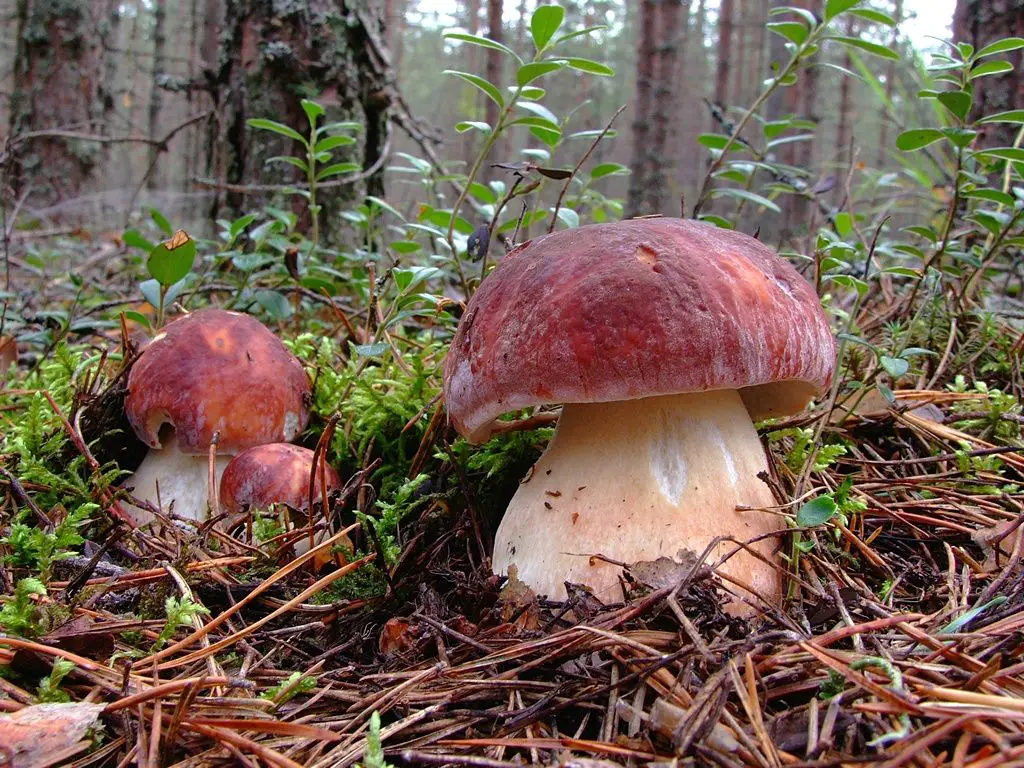
Mushroom Season Has Begun! Olga’s Blog
Olga below discusses the deeply held national tradition of mushroom gathering. An important part of Russian food tradition for many centuries, Russian children are taught in school from an early age to tell the difference between various types of native mushrooms. Many, like Olga, will go with relatives and friends to the woods to put […]

Study Abroad in America for Russians: Olga’s Blog
As part of her major program in international relations at Moscow State University, Olga applied to study abroad in the United States in 2007. As was not uncommon for students applying for study abroad in either direction, Olga hit several bureaucratic snags. What is perhaps most remarkable about the below text, however, is the description […]
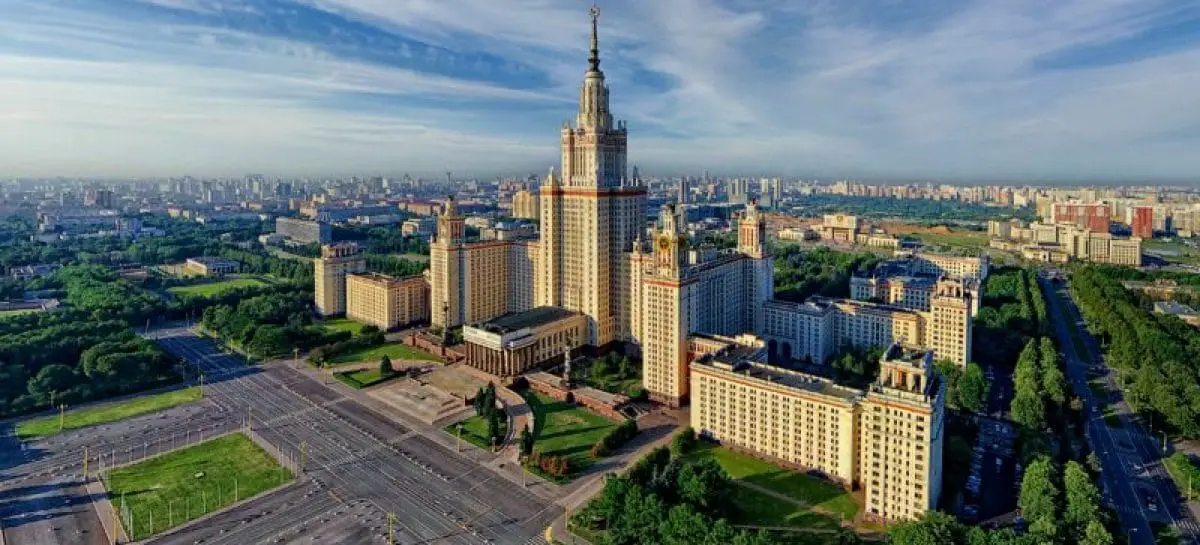
What is the First Day of University Like in Russia? Olga’s Blog
Below, Olga discusses what a first year freshman experiences on day one of their college education. The day offers no classes. It is instead filled with speeches, handshakes, and status symbols. All of this is highly indicative of the role of formality and ceremony in Russian education and Russian society. This resource is part of […]

